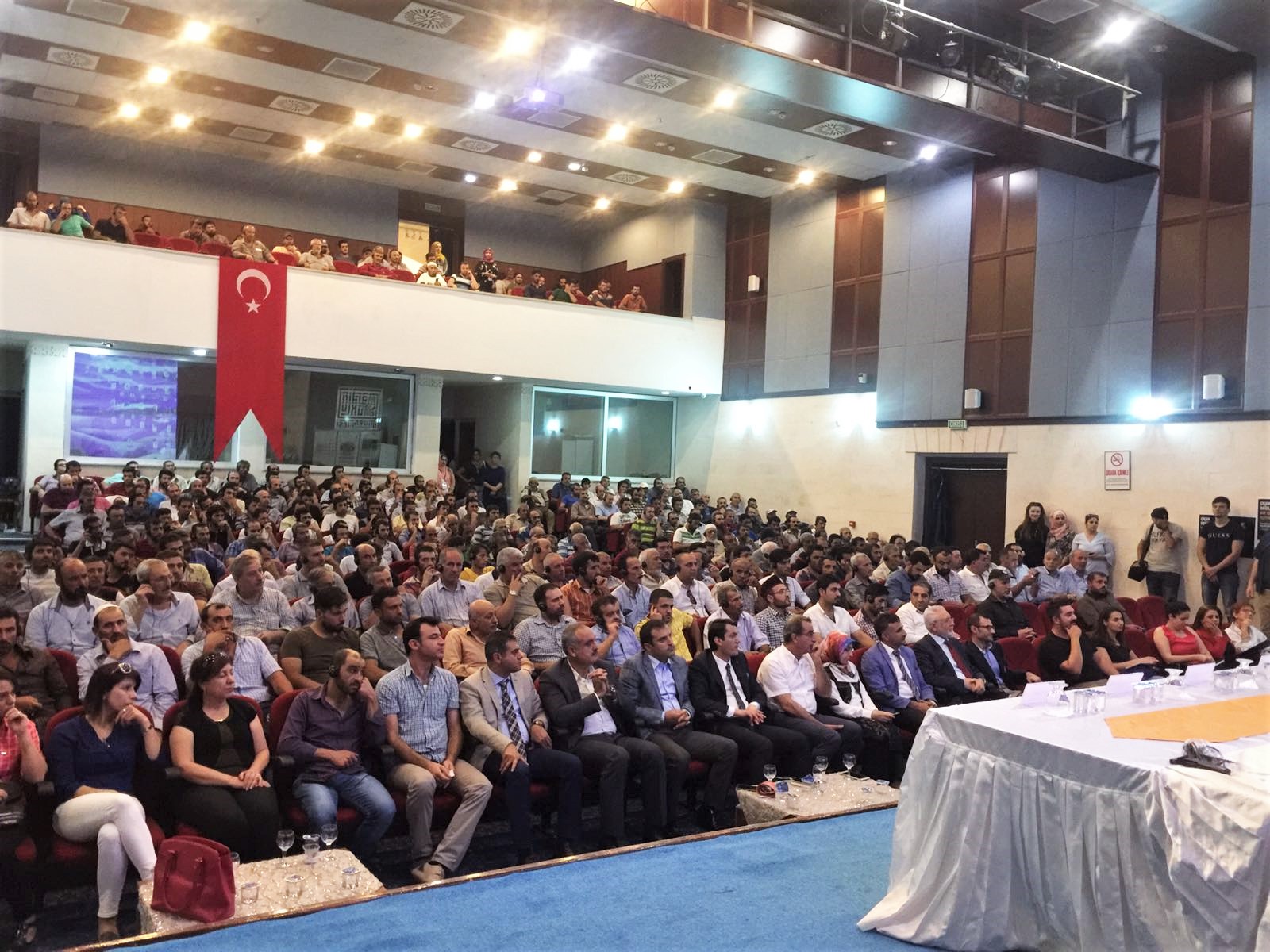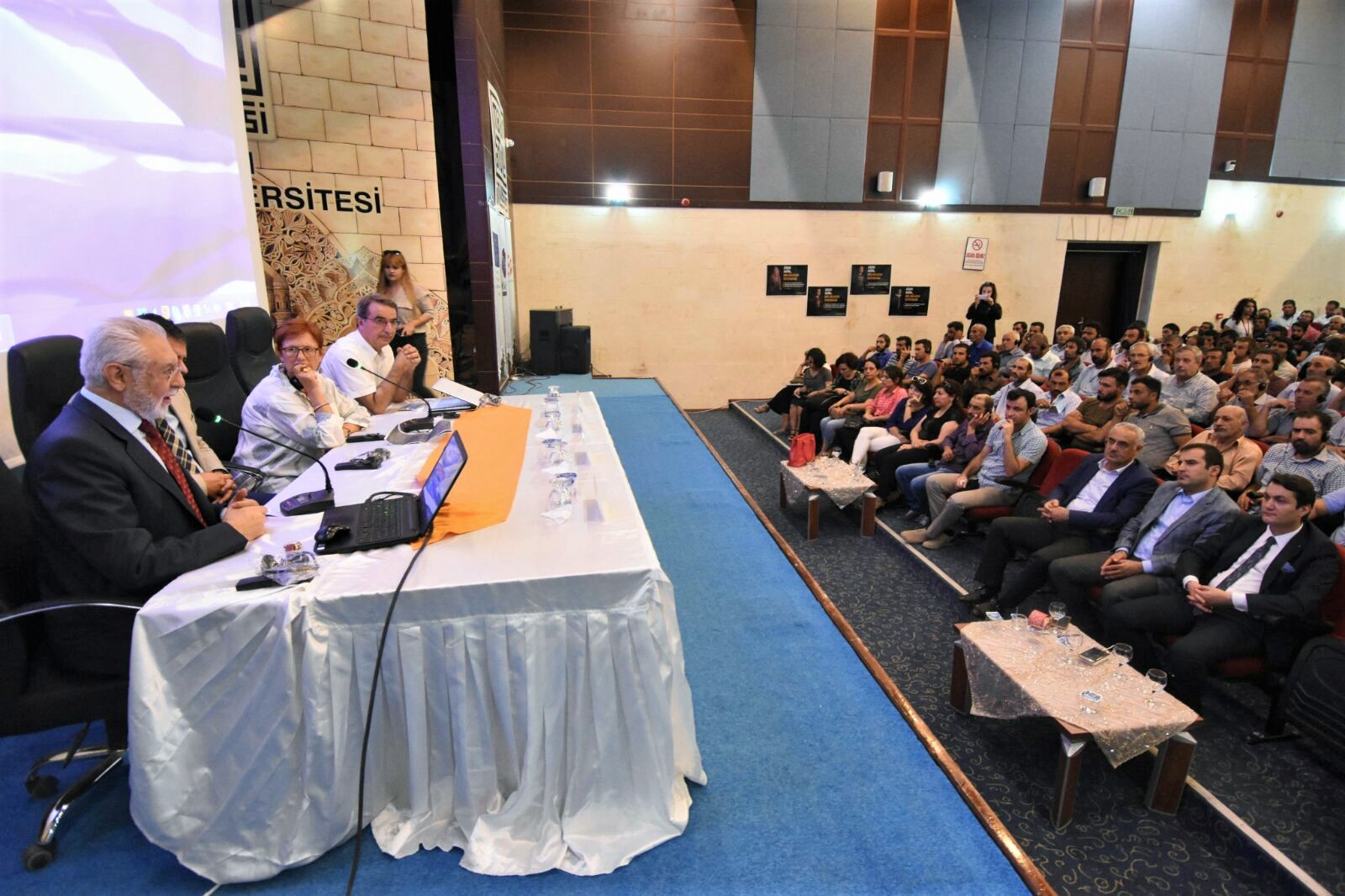The first of the “Child Marriages Panel" developed especially for refugee men by the United Nations Population Fund (UNFPA) and organized with the implementing partner KAMER was held in Mardin city center on 18 September 2017 and the second panel was held in Mardin Kızıltepe on 19 September 2017. Specialists made presentations about the Physical, Psychological and Social Dimensions of Child Marriage, Laws on Early Marriage and Early Marriages According to Islamic Law to more than 1.000 male participants which were organized to draw attention to and raise awareness about child marriage issue which is frequently experienced in refugee families in Turkey and is a violation of rights of children.
Both of the "Child Marriage Awareness Panels” are funded by the European Commission Civil Protection and Humanitarian Aid Operations and organized by United Nations Population Fund (UNFPA) with the KAMER partnership. The first session was held in Mardin city center where 853 refugee men attended and the second session held in Kızıltepe was attended by 167 male refugees.

Gül ERDOST, United Nations Population Fund (UNFPA) Women’s Empowerment Specialist, in her opening speech, said: “We had organized a panel specially for female participants in Mardin in May 2017 about child marriage issue with UNFPA and our implementing partners. We observed that the issue of child marriage affects both men and women. Males (fathers, brothers etc.) who undertake the role of a decision-maker in child marriages victimize these young girls with their decisions. At the same time, males who marry at a young age are obliged to undertake family responsibilities way early and thus, leave their personal development including education and they end up being victimized too. Therefore, we decided to organize these panels by creating awareness in men"
Mardin Deputy Governor Bahattin ÇELİK in his opening speech said: “As a country that signed the declaration of children’s rights, we need to evaluate child marriage in this respect. Child marriage is a violation of children’s rights”.
Artuklu University Rector, Prof. Dr Ahmet AĞIRAKÇA stated in his presentation titled “Early Marriage According to the Islamic Law”: “In Islam, there is respect for the child. A person can only marry by building their lives on their own on a financial basis. Girls and boys need to study until they complete at least their bachelor's degree. No marriage is possible under the custody of parents”.
Mardin Public Health Director Saffet YAVUZ expressed: “There are women who commit suicide as a result of child marriage or forced marriage. I believe marriage before the age of 18 is a violation of human rights and these marriages should be considered as child abuse and the case of violence against women. Child marriage is not appropriate physically and sociologically”.
Atty. Mehmet Şahin YÜCESOY from Mardin Bar, emphasized in the panel in Kızıltepe: “Every person younger than 18 is considered a child both in our national legislation and according to the international treaties we have signed and these marriages are considered a crime. Not only those who marry but also those who encourage and witness marriage commit a crime. Both families and the state have responsibilities regarding child marriage according to the Protection of Child Law no 5395".
The United Nations Population Fund (UNFPA), with financial support from its executive partners and various international donors, will continue to organize more than 30 Child Marriage Awareness Panels developed for men and women in many cities in Turkey.

United Nations Population Fund (UNFPA) Women and Girls Safe Spaces (WGSS)
One in three women in the world marries before the age of 18. Unless essential and effective studies are conducted about child marriages, it is expected that the number of women who marry at a young age will reach 1.2 billion as of 2050. The United Nations Population Fund (UNFPA) Turkey Office has been offering capacity development, service provision, reproductive health services and hygiene supplies in women's health and violence against women within the scope of the Humanitarian Aid Program since 2011.
In this respect, Safe Spaces for Women and Girls (WGSS) have started to forge cooperation with various organizations. The centers established in various cities in 2017 with the support from the European Commission Civil Protection and Humanitarian Aid Operations (ECHO), US Government, Swedish Government and the Japanese Government mainly operate in sexual and reproductive health, gender-based violence, psycho-social support, empowerment and supply distribution for asylum seeker women and girls.
United Nations Population Fund (UNFPA)
The United Nations Population Fund (UNFPA) was established in 1969 as the biggest aid source with international funding in the area of population operating around the world. UNFPA operates in more than 150 countries for creating policies and strategies that support sustainable development. Having started its activities on a project basis, the United Nations Population Fund (UNFPA) has been working on reproductive health, encouraging social-gender equality, and collecting, using and distributing data about development and humanitarian aid in Turkey since 1971. Within this framework, the first Country Program lasted from 1988 to 1992 and now the Sixth Country Program (2016-2020) is being executed.
The United Nations Population Fund (UNFPA) works to deliver a world where every pregnancy is wanted, every childbirth is safe and every young person's potential is fulfilled. To this end, UNFPA focuses especially on 4 of the Sustainable Development Goals (SDGs); SDG 3: Good health and well-being, SDG 4: Quality Education, SDG 5: Gender Equality and finally, SDG 17: Partnerships for Goals
Follow United Nations Population Fund (UNFPA) on social media:


